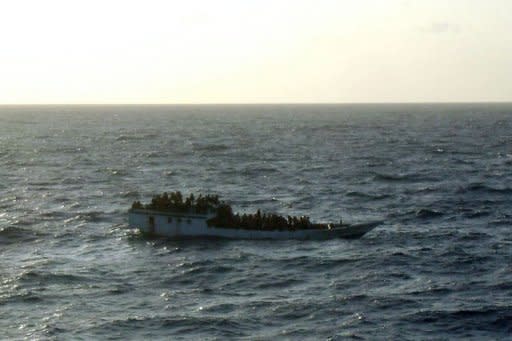Asylum-seeker boat sinks en route to Australia
Rescuers plucked 130 people from the ocean Wednesday after an asylum-seeker boat sank en route to Australia, barely a week after another vessel went down in the same area, killing up to 90. The rickety ship capsized 107 nautical miles north of Christmas Island in the Indian Ocean, the Australian Maritime Safety Authority said, adding that one person was confirmed dead so far. "We have now managed to rescue 130 people," Home Affairs Minister Jason Clare told reporters, adding that one body had been recovered. "The information that we have is that there were as many as 150 people on the boat -- that leaves many people still unaccounted for. The search and rescue continues." Prime Minister Julia Gillard described the incident as "shocking news of yet another asylum-seeker tragedy" as the heat was turned up on Australian politicians to break their deadlock on how to deal with boatpeople. The incident comes just days after another boat with around 200 people on board went down in the Indian Ocean as it made its way to Australia. In that tragedy, rescuers managed to save 110 people and 17 bodies were recovered, but no other survivors were found. Three merchant vessels, including the MV Bison Express, a Philippines-flagged livestock carrier, were on the scene of Wednesday's disaster, which happened in Indonesian waters. The vessels responded to the AMSA call for assistance and rescued survivors while two Australian navy ships and a spotter aircraft were also helping with the rescue effort in conditions described as "fair, not ideal". In a statement, Customs said police received a satellite phone call early Wednesday from the vessel and "initiated an immediate response". Details were passed to the Indonesian rescue authority Basarnas, which said it understood the generator was broken and the boat was taking on water. A photo posted on the AMSA website showed a small, basic-looking boat crowded with people on its decks, taken by the MV Bison, before it capsized. The Australian Broadcasting Corporation said most of the passengers were believed to be Afghans, though this could not be confirmed. The accident is the latest in a series of refugee boat disasters in recent years, as unseaworthy, overloaded vessels packed with desperate migrants struggle to reach Australia. Most boats originate in Indonesia, but there has been a recent spike in attempts from Sri Lanka. Though they come in relatively small numbers by global standards, asylum-seekers are a sensitive political issue in Australia. Both sides of Australian politics support offshore processing but differ on where it should be conducted. Canberra clinched a deal last year to send 800 boatpeople to Malaysia in exchange for 4,000 of that country's registered refugees in a bid to deter people-smugglers from the dangerous maritime voyage to Australia. But Gillard's fragile coalition government was unable to pass the required legislation through parliament without the support of the opposition, amid concerns Malaysia was not a signatory to UN refugee conventions. Opposition leader Tony Abbott, who supports processing on the Pacific island of Nauru and turning boats back when possible, again ruled out the Malaysian solution Wednesday. In response, Gillard pushed for a private members bill by independent MP Rob Oakeshott which would allow an immigration minister to designate any nation as an "offshore assessment country" if it was party to the Bali Process. The Bali Process is a regional cooperative framework for dealing with asylum-seekers involving more than 40 countries. The bill narrowly passed the House of Representatives after some six hours of emotional debate by 74 to 72 and will be debated and dealt with by the Senate on Thursday. "We are on the verge of getting the laws we need," Gillard said. "I believe each and every senator should consider this matter deeply overnight."





